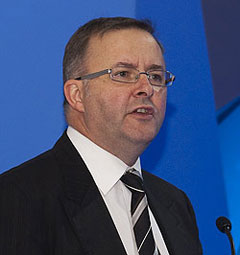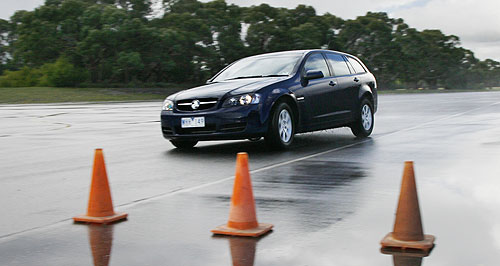Make / Model Search
News - General NewsHit the skids on ESC, Canberra tells VicsBack in line: Victoria's go-it-alone approach on mandatory ESC has prompted the federal government to lobby Melbourne. Federal minister tries softly-softly approach to pull Victorian ESC rule into sync23 Nov 2009 THE federal government is trying to convince the Victorian government to abandon plans to fast-track mandatory electronic stability control (ESC) rules for all new cars and SUVs sold in that state from January 2011 and fall into line with a later national roll-out. However, the Victorian government seems to be sticking to its guns on the controversial move which the motor industry opposes on the grounds that it creates two sets of rules on the safety technology – one for Victoria and another for the rest of the country - for almost three years. The federal transport minister Anthony Albanese told GoAuto on Friday that his government agreed with the stance of the Australian automotive industry that rule changes for cars should be rolled out simultaneously across the country. “It would create difficulties if there are different timings, and given that the difference is only a matter of months, we have asked the Victorian government to harmonise with the national introduction,” he said. Asked what the Victorian government response had been, Mr Albanese said: “We are still having discussions.”  Federal transport minister Anthony Albanese. Federal transport minister Anthony Albanese.The motor industry’s peak body, the Federal Chamber of Automotive Industries (FCAI), is following the discussions closely, hoping for a breakthrough that would see the Victorian government rules brought into line with the federal proposal. The Victorian legislation, which has already been gazetted, makes ESC mandatory on all new passenger cars and SUVs sold in Victoria from January 1, 2011, unless the vehicle is given a special exemption. The state regulations ultimately will be overridden by the federal Australian Design Rule (ADR) governing mandatory ESC, which comes into force on November 1, 2011. The federal ADR, which has the support of all the other states and territories, contains similar rules for passenger cars and SUVs, but provides for a two-year honeymoon period in which only new-model passenger cars and SUVs will require ESC from November 1, 2011. Cars introduced without ESC before that date will still be allowed to be sold until 2013. Under both sets of rules, commercial vehicles – including utes – are exempt. However, the FCAI is working with government authorities on a timetable to extend mandatory ESC to light commercial vehicles as well. FCAI chief executive Andrew McKellar told GoAuto today that the federal ADR rollout of mandatory ESC was in line with similar regulations in Europe and in line with international best practice. He said the 2011 rollout represented a rapid introduction of this safety improvement, which the motor industry was already working towards without regulation. “The industry’s record of uptake of electronic stability control is up with the best in the world on this,” he said. “In the absence of any regulation whatsoever, we are already approaching 70 per cent of new passenger cars and SUVs being fitted with ESC by the end of this year. “We expect to be very close to 90 per cent take-up by the end of next year. “That’s is pretty much as good as has been achieved anywhere in the world.” Mr McKellar said the FCAI had had “strong engagement” with the Victorian government on the issue, and the state body had “taken on board many of the issues” that might otherwise have led to a severe impact on the industry. “Nonetheless, we remain hopeful that a fully national approach to these regulations,” he said. Mr McKellar said the FCAI was happy to let the federal government take the lead on the issue. “We wish to be guided by the commonwealth discussions with the Victorian government,” he said. “It remains our first preference that a government-to-government solution is found, one that maintains the integrity to the national system through the ADR system. “We don’t make vehicles for the Victorian market or the South Australian market or the Tasmanian market we make vehicles for the Australian market. “There needs to be a clear national standard that, wherever possible, needs to be aligned with international best practice.” At an administrative level, however, the industry has been negotiating with VicRoads to adjust processes on the ESC rules to minimise cost and complexity if the regulations do go ahead. Mr McKellar declined to discuss details of the changes, but GoAuto understands that one relates to a requirement that all passenger cars and SUVs sold in Victoria be fitted with a separate ESC compliance plate. Instead, motor companies will now be required to supply a list of vehicle identification numbers (VIN) of complying vehicles.  Read more |
Click to shareGeneral News articlesResearch General News Motor industry news |











Facebook Twitter Instagram